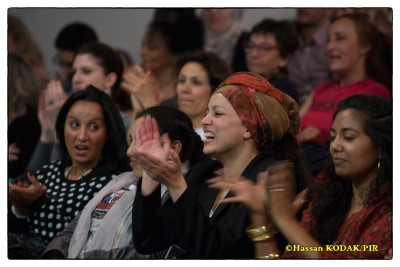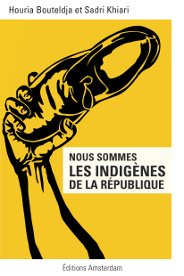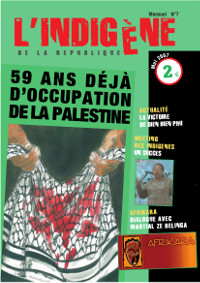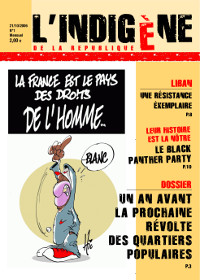May 8th is also a lot more:
For official France, and for a wide majority of French people, May 8th, 1945 is a day of celebration. For the descendants of the colonized, and for the anti-colonialists, it is a day of mourning. Today we are sad. But beyond mourning, there is the political nature of May 8th.
Because, the day when the Nazis were defeated, the day when the Republic and the rule of law were restored, France committed a massacre in one of its colonies. The date, May 8th, holds all the “contradictions” of the French Republic of both yesterday and today: democracy for the French, colonial system for the colonized, human rights for some, torture for others, universalism for some, indigenousness for others; and today, citizenship for some, discriminations, police crimes, racial profiling, and denial of History for others. This history, and the present time, generate the notions of them and us, whether we like it or not. If we want to get out of this rut, out of this deadly confrontation, and escape the conflicts and the impending civil wars, it is high time to face the profound “contradictions” that structure this bitter Republic, which is nostalgic for the heyday of its colonial power, to face this Nation State that never renounced its Empire and that everyday creates the conditions for a conflict between civilizations, from which nobody will come out unscathed.
May 8th is even more than everything I just mentioned:
First, we are the day after May 7th. May 7th, 1954 was the day of a historic and revolutionary victory; it was Diên Biên Phú in Vietnam. A historic victory for the colonized, a beating for the colonialists.
May 8th is also two days prior to May 10th; a day “chosen” by descendants of the African deportees to commemorate one of the greatest crimes against humanity, the transatlantic trade, commonly called the slave trade.
The year 2015 is freighted with symbols, we are commemorating four major events:
. First, as I just stated, on May 8th 1945, the 70th anniversary of the massacre perpetrated by the French army in Sétif and Guelma in Algeria.
. In 1955, the 60th anniversary of the International conference in Bandung.
. The 10 years of the law approved on February 2005 and that recognizes the presupposed positive work of France in its colonies.
. And finally, in the autumn of 2005, the 10th anniversary of the riots in the French suburbs that set the country ablaze for more than three weeks and undermined the power in place as much as the political observers.
So there we are, May 8th is all of that at the same time: beatings and victories, dirty tricks and resistances, and an inestimable political legacy with numerous reasons to keep faith in the struggle against racist and imperialist oppression.
Today, thus we mourn. Today is the day to commemorate. Firstly, the indigenous commemorate to pay tribute to their dead. To all the people, from Madagascar, from Senegal, from Viêtnam, from Tunisia and elsewhere, massacred by colonial troops.
To commemorate is to remember, it is to revive those dead people, to rehabilitate their fight, to restore their dignity, to give them justice. To commemorate is to symbolically erase their sorrows, it is to transform the victims into heroes. The indigenous refuse to forget, because forgetting would be making those dead people useless. To pay tribute to those dead people is to perpetuate their memory, to continue their presence; it is to transform the dead into actors of the current struggles that are the prolongations of their own struggles. No spirit of revenge here; but a will to transform the world so as to be comfortable in it, that’s all.
This is why I invite you for a moment of reflection with the celebrated flute player Said Akhelfi, who I thank for being here today, and with whom we are going to pay tribute to all the wretched of the earth.
Thank you Said and once again I want to thank all of you for being here tonight. As I previously said, we aim to celebrate the 10th anniversary of le P.I.R with dignity. Thus, I suggest that I present le P.I.R, for we are an organization that triggers a great deal of questions, controversies, and sometimes admiration, or sometimes hatred. But seldom do we leave people indifferent. I entitled this short speech: What will become of all this beauty?
I won’t make a political assessment of le P.I.R that would be too fastidious. Ten years is a short period and it is a lot for an autonomous organization led by activists stemming from post-colonial immigration. It is even a miracle. The only comment I want to make is that we are proud of our work, of our faith, and our determination. We are proud to have survived without having to ask the political power for money, we are proud to have survived without pledging allegiance to the French left, nor any other political force; not even the radical left. We are proud that we never renounced our convictions: be it the existence of a white political field, or the existence of social races. We are proud to have invented our own vocabulary, and to have constructed our own thoughts from our own history, with our life experience and our social reality. We are proud to have contributed a political content to the notion of autonomy, we are proud to have created our own politics, our own strategy, to have invited our white allies, or to have known how to sacrifice them when it was necessary. We are proud to have raised the central issue of power and of the adequate strategy in order to reach it. We are proud to have heard Abdelmalek Sayyad when he taught us:
« To matter is to matter politically ». We are proud to be heirs. And above all, we are proud to have convinced many arabs, blacks, muslims, and residents of deprived neighborhoods, of the reality of colonial persistence and the necessity for autonomy. We probably count more defeats than victories; of which we have made a critical assessment in our book: We are the Indigenous of the Republic. Amongst our greatest failures, that of not having succeeded in unifying the main victims of institutional racism: Blacks, Arab-Muslims, and Gypsies, into one organization. Or, that of not having succeeded in forming a social basis which is large enough to have influence in the political game and create a balance of power able to efficiently defend the interests of this group, of this community of conditions that today represents the France which is below the France-at-the bottom: the French ghettos, and the French suburbs.
Now, I want to thank all those who supported us at one time or another of this decade. I particularly want to thank those who have hung on and who continue to defend us in their organizations. Many are those who have left us along the way, but many are those who have braced themselves hard and think that our voice and our action are essential to the French political landscape and that they must be respected.
I thank all of le P.I.R activists of yesterday and today. I specifically want to thank Sadri Khiari for his theoretical and inestimable contribution. I suggest that you get to know him, as he is today a major figure when it comes to the racial and the decolonial question in France. I would like to thank Youssef Boussoumah as well, a seasoned activist of the Palestinian struggle and of the third world, and someone who has crossed path with many generations of activists since the 1980s. I would like to thank M’baireh Lisette, a Tchado-Caribbean militant and our companion from the early days; whose experience as an activist represents one of the pillars of our organization. I also would like to thank Ramon Grosfoguel, a Puerto Rican professor at UC Berkeley in the U.S, and a prominent anti-colonialist militant, who has always actively supported our action. To all, our infinite gratitude. Finally, I want to thank St Denis City-Hall to welcome us tonight.
We have friends and we have foes. Irreducible foes. Amongst them, the entire French political field, from the Socialist party to the far right, not forgetting the U.M.P and the U.D.I. Because they have shared the power for the last forty years, because their political practices are blatantly against the deprived neighborhoods and against immigration, or because they are so obviously racist and imperialist, no alliance will ever be possible with them. With all the others, we are extremely critical. They all belong to the white political field. They all are, to a degree or another, Eurocentrics who think from the perspective of the benefits of the white middle-class and the white working-class. They all contribute, to a degree or another, and even unwittingly, to the political exclusion of the post-colonized and the residents of deprived neighborhoods. They are not always our spontaneous friends, but we find our allies in this section. They are our companions when we mobilize against police crimes, against state racism, for the undocumented people, against French neo imperialism in Africa and for Palestine. Thus, we fight both with them and against them. And to quote Sadri Khiari:” It is because the left is our privileged ally that it is our primary adversary”. Our enemies are organized. They are: the Socialist Party, the right, and the far right. But also non-profit organizations such as: SOS Racisme, NPNS, le CRIF, la LDJ, Français de Souche, Egalité et Réconciliation, l’Agrif and so many others. And we could add that, as of a few days ago, and against all odds, the national leadership of Le MRAP who portrayed us as anti-semitic. We hope that MRAP activists will see through this to prevent this anti-racist organization, for which we had a lot of respect during Mouloud Aounit’s time, from drifting into national republicanism. We could add the media:
The weekly magazine Marianne for example declared an undying hatred for us from the beginning. And we have the honor to count amongst our enemies some popular personalities such as: Caroline Fourest, Elisabeth Lévy, Elisabeth Badinter, Philippe Val, Ivan Rioufol, to only name a few of them. But, one has our preference, most likely because compared to the others he is the most sincere and the craziest: Alain Finkielkraut. So, for our anniversary we had to pay tribute to the man who faithfully walked with us for the last ten years. I’ll leave you the pleasure of listening to him:
“There are no indigenous people in France”. Yes, Mr Finkielkraut, there are indeed indigenous people in France; the proof is that they are fighting. Actually, there is a struggle of social races in France. The word is scary, and yet, there is nothing more commonplace than the struggle of social races. It is so commonplace that you cannot see it. Nonetheless, it structures our daily life. The struggle of social races or the manifestations of resistances by social races is everywhere:
. The struggle in Sonacotra hostels.
. The struggle for the undocumented people.
. The fight against the double penalty.
. The struggle of the CCIF against islamophobia, and the MTE for a school for everyone (including teenagers wearing a headscarf).
. The fight against police crimes or racial profiling.
. The huge mobilizations of those called the “Gaza Generation” against the bombings in 2009 and 2014.
. The struggle for reparations, in memory of slavery.
. The struggle of neighborhood organizations to obtain the permits to build a mosque
. The annual gathering of European muslims f in Le Bourget as an expression of cultural resistance for muslims.
. Tariq Ramadan’s success to get the attention of muslim youth for twenty years, while the same youth shows a great deal of disinterest for traditional political organizations.
. The mobilization against Exhibit B, the performance that was received by the descendants of Africans as an insult to their history and to their moral and physical integrity.
. But also all those who felt bound to express, even though they condemned the attacks, that they were not Charlie.
The struggles of social races are struggles that transform France, and they must be credited as social struggles aiming towards a better life for everyone. But sometimes, these resistances are ambivalent, surprising, disturbing.
. When muslims offer flowers to passers-by in order to demonstrate that Islam is good, that Islam is not what they think it is. This is a manifestation of indigenous resistance. Obviously very naive, surely defensive, but it must be recognized as such.
. When blacks strive to collect all the inventions and discoveries made by Africans in an attempt to convince others of their existence, and in order to convey that they are capable of inventing, it is a response, still naive, but nonetheless a response, to the negrophobic disregard, and the denial of civilization experienced by Africans for the last 500 years.
. To campaign against the Communist Party or le Socialist Party and to support the right-wing in order to take revenge against the first ones, is also a manifestation of the struggle of social races. The changeover towards the right by many activists in deprived neighborhoods is an attempt to punish the left, and sometimes to get rid of socialist and communist mayors. This is a struggle of social races. Indeed, it is an act of indigenous resistance to be liberated from the patronizing left. It is ambivalent, surely leading to dead ends, but here as well it is important to recognize the struggle of social races.
. The acts of traitors such as Rachida Dati, Malek Boutih, or Rama Yade are also manifestations of the struggle of social races. Their devouring ambitions, their social rises which make them look like “« Bel Ami(s) » from the immigration that need to stamp on us in order to succeed, this is indeed a manifestation of the individual and selfish struggle of social races. When Rachida Dati gets the department of Justice, a regalian department, when she is at the peak of her power, and as much a traitor as she can be, she cannot not think about her mother Zohra (whose name she gave to her daughter), and about the ascension of the child of working-class North Africans . She has her revenge over History. Even if we must fight them, the traitors participate, in their own ways, to the struggle of the indigenous.
Finally, the manifestation of social races can clearly have an ugly and dreadful dimension. The attacks against Charlie Hebdo, and the kosher supermarket are examples of such a dimension.
In the social races, there is the best and the worst. From the softest, to the most liberating, not forgetting the craziest, and the most destructive. There are the struggles that make us move forward, and there are those that make us regress. The dead ends of the racial system prompt the victims to offer flowers, make lists of inventions, or create: Mohamed Merah, Coulibaly, and Kouachi.
At this moment of my speech, I wish to mention this fundamental question raised by James Baldwin, the outstanding African-American writer who left us a great literary work that must be discovered. His question was:” What will become of all this beauty?” I quote:
“What will become of all this beauty? Because blacks, even if some of us, blacks or whites, do not see it yet, are very beautiful. And when seating at Elijah’s table we talked about the revenge of God: when this revenge will be consumed, what will become of all this beauty? I also felt that the intransigeance and the ignorance of the white world may render this revenge inevitable.”
When James Baldwin asks this question: « what will become of all this beauty? » He is worried. He is worried for the blacks and he is worried for us. He is worried about our beauty. He is worried because he feels that the system wants to devour us, putrefy us, and corrupt us. He is worried because he questions our capacity to remain human, to respect and to love one another without turning the other cheek.
Here I would like to talk about someone who offends our beauty, and who leads some of us, and more precisely integrates us, with his obscenity, in the terrifying story of western modernity in its worst.
At le P.I.R, we are anti-colonialist, therefore anti-zionist. Nothing will stop us from supporting the fair struggle of the Palestinian people, nothing will stop us from supporting its resistance even when it is armed or inspired by the Muslim faith. Like Nelson Mandela reminds us, it is the oppressor who sets the rules of the struggle. And we will never be intimidated by any accusation of antisemitism. Nothing, and I repeat, nothing, will make of us memory or tomb profaners. Nothing will make us foul advocates of the denial of the Jewish genocide.
We are very serious about the Palestinian question and it should never become the pretext for little fascists to inoculate us with the poison of hatred, whatever the form it takes. To follow and to surrender under such provocation is to become integrated with imperialist mental structure and western racism. It means that we submit to the ideologies that exterminated our ancestors before the Jewish and the Gypsy genocide. Are we ready to abandon our beauty? To sell it off, and to sell it to those who have oppressed and despised us? Could we be so integrated, and so soiled from the inside that we can gargle for a quenelle (a neo Nazi sign) at the Shoah Memorial, over the victims’ graves to whom we must give as much respect as to all the dead from the crimes of the Occident. The same goes with the killings of January 7th 2015 in Paris. Some indigenous, blacks and muslims have committed crimes. At le P.I.R, we know well that those killers belong to our social group and that they are the products of France; and thus they are, above all, creatures originating from the imperialist violence. We know that they are the product of racism, islamophobia, and negrophobia. They are the products of the social ghetto in which they are incarcerated. They are the products of the horrifying imperialist wars in Iraq, in Afghanistan, and in Palestine. But we do not ignore the “progressive” or leftist, political field’s responsibility as it continues to apprehend the suburbs with strictly economic analytical frameworks aimed to marginalize the racial question, the questions about identity and religion, as well as the fundamental question of our trampled dignity. We do not underestimate our own responsibilities. We do not ignore that the Kouachi brothers aimed to avenge the prophet of Islam, ‘alayhi salat wa salam’, because we are still too few and not organized enough to defend the sacred of the wretched of the earth. We know that Coulibaly killed Jews, because we are not organized enough to offer a credible alternative in response to the state-owned hierarchy of French communities that are competing against one another ; a phenomenon that we must call state philo-semitism in defense of the Palestinians against the French Zionist movement. The fall into this blind violence is precisely what James Baldwin feared the most. Blacks are beautiful: what will become of all this beauty?
In another book, In the Skin of a Black Man, a white man transforms into a black man and shares his experience as a black man during the 1950s in America. He meets a black man that tells him this about white people:
“They are the children of God as much as we are. God tells us clearly. We must love them. Let’s see, if we hate them, we are lowering ourselves to their level (…) If we ceased to love them, then they would become the winners. In fact, they would have achieved the destruction of our race. They would have made us touch the bottom”.
At le P.I.R, we are conscious of the political importance and of the relevance of the question asked by James Baldwin: what will become of all this beauty? What will become of our legacy of struggles? What will become of Césaire, Fanon, Lumumba, Djamila Bouhired, Solitude, Lalla Fatma Nsemeur, or Malcom X? Are we their heirs, or not? In other words, are we capable to walk in their footsteps in order to preserve the hope of a fraternal humanity; one that denounces the injustices of a system, but that can in no instance lash out on human groups for what they are?
Today, in the context of economic crisis in Europe, in a Europe where the far right movements get alarming electoral score results, in a Europe which is more and more closed and indifferent to the thousands of immigrants who awefully die in the cemetery that the Mediterranean sea has become, our challenge is to escape a destiny that could transform us into complicit auxiliaries of this selfish Europe. Our challenge is to pursue the decolonial struggle to save the indigenous beauty. And tonight, we will pursue it with women: women in struggle, rebellious women, women who are the direct heirs of the dead we are commemorating, sisters in struggle who continue their fight against injustices and inequalities, and their fight for dignity. le P.I.R wishes to honor the struggles of women coming from the colonial history for two main reasons:
First: We, the women in struggle stemming from the colonial history, are unknown. In this country, we are oppressed as postcolonial subjects, as women, and as poor. We are oppressed as workers, as mothers, as sisters, as daughters of immigrant workers. Our load is heavy. It weighs on us. In addition to state violence, we endure men’s violence (physically and morally), a violence aggravated because our brothers are themselves the victims of structural violence that damage them; and for which they are making us pay the high price. Nevertheless, we are still here. Unlike what is usually said, we are here, next to our families, our children, our mothers, our fathers, our brothers, and our neighborhoods. We have never abandoned the field of struggles.
Today, we want our fight to be recognized and documented as the legacy of neighborhoods and immigration struggles. Even more, we want to have them recorded with the struggles for emancipation that shape France every day. Subsequently, we refuse to be manipulated by the French colonialist state against our communities, and against our men. We refuse to be NPNS activists serving the white imperialist patriarchy. We are radically against the racial profiling of non-white men whose humiliation we pay the high price.
This is why, we are very honored that more than twenty female activists stemming from the colonial history have accepted our invitation. Here they are:
Amal Bentounsi, Hanifa Taguelmint, Zohra el Yamni, Sihame Assbague, Hanane Karimi, Casey, Malika Salaun, Louisa Yousfi, Bams, Vanessa Thomson, Maboula Soumahoro, Sarah Carmona, Anina Ciuciu, Lila Charef, Nacira Guenif-Souilamas, Ismahane Chouder, Aya Ramadan, Joby Valente, Françoise Vergés, Souraya el Kahlaoui, Mireille Fanon Mendés-France, Bahija Benkouka.
From the bottom of my heart, I thank them.
I said at the beginning of my speech that le P.I.R wishes to celebrate its 10th anniversary with dignity. We do not know how we could have celebrated this anniversary with more dignity than today. Indeed, a very important woman, a powerful activist, a woman who triggered the pride of millions of people around the world, has accepted to be with us, to celebrate our action, our militant commitment, perhaps, but I am probably presumptuous, a beauty we want to save. This woman, this beautiful woman in the sense that James Baldwin meant, is Angela Davis.
Houria Bouteldja, Saint Denis, France, May 8th, 2015
Translation from french by Fatimata Vétu








